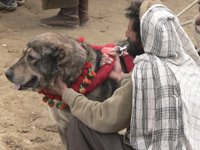 I remember my first Friday outside of Kabul: it was a sunny day in March that we spent at Quargha lake, eating kebab at a local picnic place. We were sitting in a Pakistani-style shelter, enjoying our meal. Next to us four young Afghans were drinking vodka, trying to shelter the bottle with their coats. When the bottle was finished, Afghans just threw it away. The empty vodka bottle rolled down the hill, stopping just alongside our shelter. I really didn’t like this situation: it seems like we just finished the bottle.
I remember my first Friday outside of Kabul: it was a sunny day in March that we spent at Quargha lake, eating kebab at a local picnic place. We were sitting in a Pakistani-style shelter, enjoying our meal. Next to us four young Afghans were drinking vodka, trying to shelter the bottle with their coats. When the bottle was finished, Afghans just threw it away. The empty vodka bottle rolled down the hill, stopping just alongside our shelter. I really didn’t like this situation: it seems like we just finished the bottle.
Some days ago I got an email containing information about police raids in Kabul restaurants. As a result many of Chinese “restaurants” (actually, bordellos) and Samarkand bar – popular dancing place among young internationals – were closed down. Nine internationals were arrested. There are rumours about new law waiting for approval in parliament. After its acceptance police can arrest any international who seems to be drunk.
Actually, I have been expected something like this. It was really weird to visit supermarkets for internationals (like Blue or Supreme), filled with alcohol bottles. Choice was superb and prices were cheap. Markets were full of men wearing bullet-proof vests and helmets, buying alcohol by boxes.
 One can hear two versions why alcohol disappeared from the markets in last autumn. First, Islamic Government is really concerned with availability of alcohol. Secondly: it is a question of money. Considering the low prices, it was clear, that taxes were not included. When government started taxing alcohol, shops refused to pay. Alcohol moved out or it is just hidden, as informed people tell.
One can hear two versions why alcohol disappeared from the markets in last autumn. First, Islamic Government is really concerned with availability of alcohol. Secondly: it is a question of money. Considering the low prices, it was clear, that taxes were not included. When government started taxing alcohol, shops refused to pay. Alcohol moved out or it is just hidden, as informed people tell.Sometimes we go to eat at an Indian restaurant close to our house. This place needs some cleaning, because it is really dirty. But in some odd way, food is excellent. There are always plenty of Sikhs or Afghans drinking whisky by bottles. The restaurant is selling bottles to everyone as well. We have witnessed a situation when Afghan bought a bottle of vodka, poured down the vodka into an empty plastic bottle signed as mineral water and cycled away….






